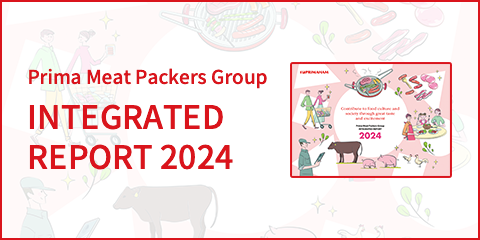- IR TOP
- Business Plan
- Business risks
Business risks
Risk management
Basic Approach
To prevent or minimize the damage of business risks, we have established the Risk Management Rules, which stipulate measures for preventing risks from occurring in the first place and the optimal ways to respond to risk events once they occur.
Situational risks that emerge
- When we commit a mistake that seriously harms our business partners or customers
- When we are held responsible for committing a legal violation
- When our financial disclosures lose their credibility
- When we sustain severe damage in a natural disaster
- When sensitive information is unduly divulged or leaked to third parties
- When our continued operation is otherwise threatened
Risk Management
Our Risk Management Rules categorize risks according to causal factors and specify measures for preventing the risks from occurring. Such measures include establishing rules, producing manuals, and issuing directives. Prima Meat Packers has established code of conduct detailing specific routine workflows to ensure that the management philosophy is put into practice. The Company has also established a Food Safety Policy to ensure that all our business activities contribute toward the goal of delivering safe and tasty meals to the table.
We follow the Risk Event Response Manual, which outlines the steps to follow in accordance with the anticipated severity of the damage. If the damage is expected to be extensive, a central task force headed by the president will coordinate the emergency responses of the affected departments.
The employee handbooks we issue each year include content on the initial steps to take (there are separate instructions for serious customer complaints, food poisoning incidents, work accidents, traffic accidents, and natural disasters). This information gives employees an idea of the right actions to take in an emergency.
Climate-related Risks
Climate change is a worldwide problem and one that impacts our business operations. Examples of the climate-related risks we face include higher prices for raw materials and animal feed.
Recognizing climate change as a major source of business risk, we have endorsed the recommendations of the Task Force on Climate-related Financial Disclosures (TCFD) and we disclosed climate-related information in accordance with the recommendations.
Business Continuity Planning
Part of our risk management strategy involves business continuity planning. We develop plans to keep our businesses operational during a natural disaster or a wave of infections. During such events, we will promptly place ourselves on an emergency footing to manage the dangers, and work to contain the damage. Mindful of our corporate social responsibility, we will work to recover normal operations and assist the recovery efforts of affected communities and government bodies.
Monitoring Risks
Every fiscal half-year, risk information is reported to the Board of Directors of Prima Meat Packers. The risk information is categorized as follows: Food safety and reliability risks, regulatory risks, occupational health and safety risks, compliance risks, information security risks, and transaction risks. For high-magnitude risks, the board is continually updated about the risk in question until the risk is resolved or no longer a concern. In this way, we work to minimize threats to our business operations.
Of the risk categories mentioned above, food safety and reliability risks are the most critical concern to us as a food manufacturer. Accordingly, we make extra efforts to communicate such risks across the Group. For example, we hold quarterly meetings to discuss customer feedback about our products, inform each business about regulatory developments, and inform production sites about the measures they should take to ensure food safety and reliability. We also hold monthly meetings to discuss price trends in raw materials and make sure that our businesses are procuring their materials for a reasonable price.
Anti-infection Measures
On March 17, 2020, we initiated a business continuity plan to deal with the growing threat of COVID-19. As part of the plan, we established a taskforce headed by the president. The taskforce worked to prevent or contain infections on Company premises primarily to protect employees and other stakeholders but also to fulfill our social responsibility to maintain stable supplies of food products. Through these actions, we created value in the following ways: 1) We raised confidence among employees and other stakeholders, 2) forged new sales channels and distribution means to expand our clientele, 3) created new business opportunities and ways of working, and 4) built solid supply chains.

